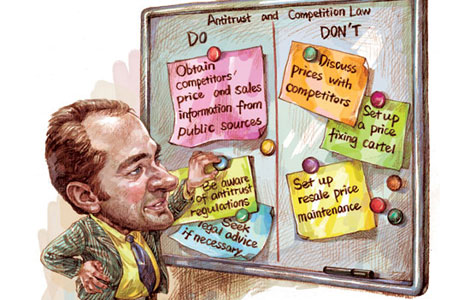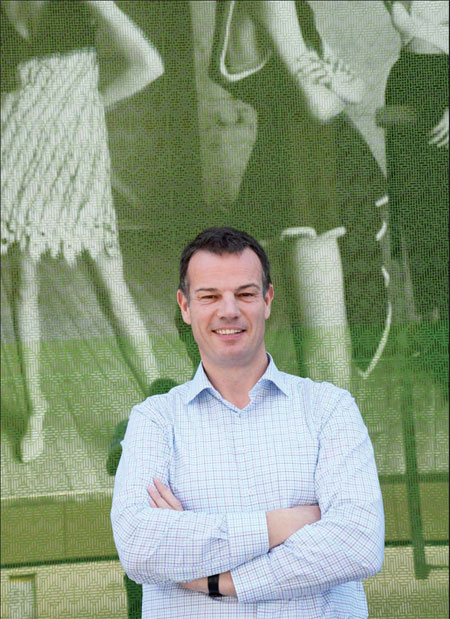An eventful life
Updated: 2013-09-27 09:43
By Mark Graham (China Daily)
|
|||||||||||
Since moving to China, Event manager Richard Rheindorf has had to reevaluate the way he works
Organizing large-scale events in China, featuring thousands of people from all corners of the globe is all in a day's work for Richard Rheindorf.
The Germany-born executive is based in Beijing, a city which is becoming increasingly popular as a destination for events, conventions and conferences. The largest in recent years was the World Congress of Cardiology, which featured more than 10,000 participants, and their wives and partners.
Rheindorf is deputy managing director of MCI, a Switzerland-headquartered company that specializes in putting on such mega events. It means organizing everything big and small including booking and equipping the conference venues, securing sightseeing trips, arranging dinners and banquets and catering to special requests.
For Rheindorf it is a perfect job: he has been intrigued by China for much of his adult life before finally securing a posting to the country five years ago. It allows him to pass on two decades of expertise to local colleagues, ensuring that events in Beijing and Shanghai are staged seamlessly, and to be an integral part of the world's fastest-growing economy.
He says: "I am living my dream, I really enjoy living in China, it is such a different culture and forces me to get out of my comfort zone to forget what I learned in Europe and the United States before to learn the culture and try to understand the people. You learn every day. It is fascinating."
Many of the events that MCI stages are on behalf of professional associations representing a wide range of industries. Their aim in coming to China is two-fold: to stage their gathering in a new, and adventurous, location and to attract new members in China.
Such is China's importance in the contemporary business world that professional bodies that have not staged conferences here may well be missing out on potential business. As Rheindorf points out, holding top-level talkfests in China offers a chance to meet the main decision-makers in the country, vitally important for future business development whether your chosen industry is pharmaceuticals, power plants or plastics.
These days it is relatively straightforward to put on mega-events given that Beijing has world-class convention facilities and something like 120,000 hotel beds. But, Rheindorf says, there are certain local protocols that have to be adhered to; swaggering in with the West-is-best attitude risks upsetting and alienating local partners.
"Relationship building is very important," he says. "You have to integrate your Chinese partner right away. The hardest part is for people to understand the cultural differences. If you come to a culture like China then what you know from before has to go to the background, you have to build relationships, guanxi.
"You can't say you have done this conference for the past 20 years, let me show you how to do it. You come to China to bring knowledge and technology and experience to help Chinese business grow; this should be the first purpose."
The World Congress of Cardiology, held over three days in Beijing, featured 6,000 delegates from overseas and 4,000 from China. The main aim was for the heart doctors to swap professional notes, learn about new developments in their professional field and acquaint themselves with what is happening in China.
As well as the crammed daytime congress schedule, there were large-scale dinners and banquets, along with post-event visits to sights such as the Great Wall and in Forbidden City. Delegates also had the option of adding on trips to cities such as Shanghai or the terracotta-warrior city of Xian.
Another big-ticket event was the International Astronomy Union gathering, held for the first time in China, and lasting for an unusually long three weeks.
Virtually every day sees some kind of large-scale gathering in Beijing, with particularly strong representation from associations, and companies, involved in pharmaceuticals and management consultancy.
Shanghai, which has seen a flurry of new hotels during the last 20 years, giving it about 95,000 beds, is also well able to cope with mega events. Later this year, the International Conference and Convention Association will host its annual meeting there, with up to 1,000 delegates flying in.
It ensures that Rheindorf has a busy schedule, helping to organize events in China and venturing regularly to Europe and the United States to drum up new business. In addition, he is a member of various advisory bodies in China itself, offering expertise on how the country can generate more conference and incentive-travel business.
Rheindorf knows of what he speaks after more than 20 years in the travel industry. Before being posted to China, he had worked in the United States and Canada, representing the German Convention Bureau and the German National Tourist Office.
He is the first to say that moving to China meant a change in mindset, adapting and customizing his knowledge to the local market in order to build business. During five years in the country, MCI has seen China register some of the fastest growth of the 23 countries where it has representation.
There have, inevitably, been problems along the way, including occasions when deadlines have been met with only hours to spare. Rheindorf chuckles at the memory of a Forbidden City dinner, involving marquees, where the construction work was running late and storm clouds were looming. When workers downed tools to take their lunch, the overseas organizer went into panic mode.
"We had to calm down the project leader as she could not understand that they would break for lunch, even though the deadline was close," he recalls. "If you start yelling at them, or being unfriendly, they might not come back at all.
"I had to reassure her that, after the lunch break, work would resume and everything would be finished on time, and it was. You have to change your expectations and learn how to work with people.
"On another occasion we had a German band touring the country with a corporate group and they needed a special lighting filter which they could not find. It does not exist here. But on the other hand they needed a tuxedo to be tailor made overnight and that was possible. They were blown away by that.
"Generally then people coming here for the first time are overwhelmed especially by how modernized the lifestyle is, the rise of the middle classes and the buildings and the amount of people."
For China Daily
|
Richard Rheindorf says that moving to China meant a change in mindset. Provided to China Daily |
(China Daily European Weekly 09/27/2013 page29)
Today's Top News
Website launched to assist expat professionals
50 foreign experts honored with Friendship Awards
Up, up, Huawei finds new friends in Europe nations
Visible face of CIC investment
Shanghai opens free trade zone
Academic warns Obama on Pacific policy
Little-known now, but a big future
NSA mapping social networks of US citizens
Hot Topics
Lunar probe , China growth forecasts, Emission rules get tougher, China seen through 'colored lens', International board,
Editor's Picks

|

|

|

|

|

|






